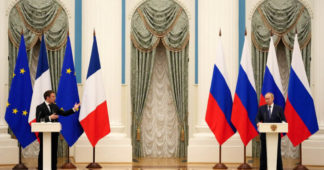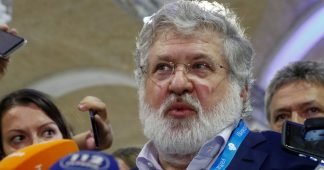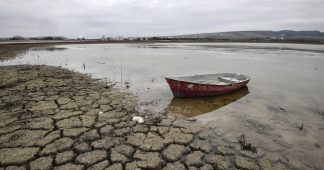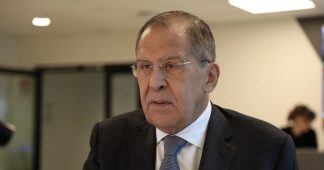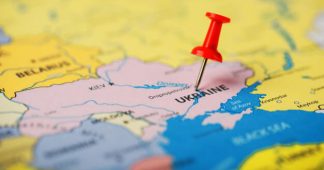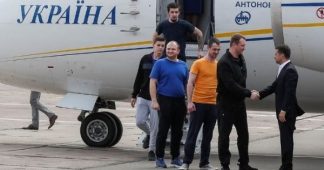Published at Alex Lantier
Feb 9, 2022
Yesterday, as French President Emmanuel Macron and German Foreign Minister Annalena Baerbock visited Ukraine, key European Union (EU) powers endorsed the demands Washington is placing on Russia in the Ukraine crisis.
The statements of Macron and Baerbock, and more broadly the entire US-led war drive against Russia over Ukraine, are based on a political lie. Even after Ukrainian President Volodymyr Zelensky and Foreign Minister Dmytro Kuleba declared that Russia is not preparing to invade Ukraine, Washington and its European allies claim they are intervening in an urgent and desperate attempt to defend Ukraine from Russian invasion. This absurd pretense was maintained in all Macron’s and Baerbock’s statements in Ukraine.
Macron, whose government holds the rotating presidency of the EU, gave a joint press conference with Zelensky in Kiev. After Zelensky briefly greeted Macron and thanked the EU for €1.2 billion in economic aid, Macron launched into a long tirade, applauding the fascist-led putsch that brought the current Ukrainian regime to power amid the Maidan protests in 2014, and endorsing NATO’s hard-line demands against Russia.
He said, “Since the Maidan revolution in 2013-2014, Ukraine has chosen the path of reform and democracy. This choice was made by the Ukrainian people, which mobilized for this goal. … This path is one on which there is no turning back. I want to pay homage to the Maidan protesters and the thousands of soldiers who have died on the front since 2014 to defend their homeland. They were fighting for Ukraine. I want to avoid all forms of simplification sometimes used by foreign forces in the interests of destabilization.”
Macron built his argument for the lies of the US-led war drive against Russia on a falsification of the politics of the Maidan putsch. The fighters that have died for the Kiev regime in eastern Ukraine were not Ukrainian army soldiers fighting foreign enemies, but members of far-right Ukrainian nationalist militias attacking Russian-speaking Ukrainian civilians. These units, such as the Azov Battalion, emerged from far-right street-fighting groups like the Right Sector that led the 2014 putsch in Kiev.
Macron’s statements amounted to a remarkable public endorsement by the French head of state and the EU presidency of far-right racist groups. The Azov Battalion’s fascistic politics and ties to neo-Nazi organizations internationally are so widely documented that in 2019 they were acknowledged even by the American FBI. It issued a report detailing the links of the US neo-Nazi Rise Above Movement, involved in the bloody 2018 “Unite the Right” rally in Charlottesville, and the Azov Battalion and one of its leaders, Olena Semenyaka.
A day before meeting Zelensky, Macron had met Russian President Vladimir Putin, who bluntly warned Macron against letting the Ukrainian regime into NATO. Putin noted that if Ukraine joined NATO, an attack by far-right Ukrainian militias on Russian-speaking regions that broke away from Kiev’s authority, such as the Crimean peninsula, could then drag the entire alliance, including America and Europe, into a war with Russia.
Macron thrust this aside, endorsing the Kiev regime’s fascistic militias as embodying the will of Ukraine. Calling for “broad, aggressive, innovative dialog” with Russia, he demanded the “return of separatist territory of Donetsk and Lugansk” to Kiev and the “protection of Ukraine’s territorial integrity.”
German Foreign Minister Annalena Baerbock toured the Kiev regime’s front lines in eastern Ukraine, wearing a bulletproof vest and a steel helmet. There, this leading member of the Green Party proclaimed her solidarity with the far-right groups on the front lines, declaring, “I want to send a clear signal here: we, all together as Europeans, are not looking the other way. We do not forget the people whose fate is being decided in this conflict. And we stand on the side of Ukraine.”
Though she was accompanied by Kuleba, who has stated that there is currently no threat of Russian aggression in Ukraine, Baerbock spoke throughout as if Germany was allying with Ukraine against an urgent danger of Russian invasion. “We cannot solve this aggression by the Russian side militarily,” Baerbock claimed, adding, “Each further aggression will have massive consequences for the Russian side.”
Baerbock’s comments were echoed at a final meeting late yesterday of German Chancellor Olaf Scholz, Macron, and Polish President Andrei Duda in Berlin. While Duda claimed that the military situation was the worst since 1989 and the fall of the Berlin Wall, denouncing an “unprecedented concentration of Russian troops along the Ukrainian border,” Scholz claimed Russian invasion plans are “extremely concerning.” He added, “Our common goal is to prevent a war in Europe.”
This is a pack of lies. The EU powers are not trying to prevent war, but echoing the war propaganda promoted by Washington. The question posed by the fraudulent pretenses of Macron, Baerbock, Duda, and Scholz is: why are the European governments lying?
The whipping up of a war hysteria against Russia is closely bound up with internal class tensions. NATO has suffered 2 million COVID-19 deaths and suffers millions of new infections each week, yet NATO governments are all ending public health restrictions and instead letting the virus spread. Amid mounting social anger against this policy and growing strikes against high costs of living, the NATO powers are working to divert class conflict into war fever.
The NATO alliance is also pursuing a vast, global geopolitical agenda in which military tensions in Russian-Ukrainian border areas are only a pretext and play a relatively minor role. By demanding that Ukraine, Georgia and other ex-Soviet republics be incorporated into NATO, the NATO powers are working to ring Russia with troops and missile bases on its borders and constantly threaten it with attack. The NATO powers cover this up behind accusations that turn reality on its head, claiming that it is Russia that is plotting aggression against neighboring states.
By placing immense military pressure on Russia, NATO is also seeking to shift its politics to the right and to isolate countries across Eurasia that have relied on Russian support against NATO. These include Syria and Iran, whom Russia has joined in fighting a decade-long war against US-backed “rebel” militias in Syria, and China, the one large country still pursuing a Zero-COVID policy.
In this regard, it is significant that the New York Times recently commented favorably on Macron’s call for a “new European security architecture.” It quoted French Economy Minister Bruno Le Maire as saying that a key question is, “Do we want a Russia that is totally aligned with China or one that is somewhere between China and Europe?” Macron’s “eventual aim,” the Times wrote, is “integrating Russia in a new European security system that offsets its lurch toward China.”
A NATO policy of placing intense military pressure on Russia to break its relations with China, Iran, or Syria is reactionary and reckless. The danger is mounting that more aggressive factions of the Russian post-Soviet capitalist regime, fearing total encirclement, could decide to use their military to pre-emptively crush the emerging NATO military build-up in Eastern Europe, launching an all-out war between nuclear-armed states.
The reckless policies of the European imperialist powers, who long were presented as the more gentle and less militaristic powers inside NATO, also constitute a warning to workers internationally. None of the capitalist powers either can or intend to halt the drive to war, which can only be stopped by an independent, international mobilization of the working class.
Published at https://www.wsws.org/en/articles/2022/02/09/euro-f09.html?pk_campaign=newsletter&pk_kwd=wsws
We remind our readers that publication of articles on our site does not mean that we agree with what is written. Our policy is to publish anything which we consider of interest, so as to assist our readers in forming their opinions. Sometimes we even publish articles with which we totally disagree, since we believe it is important for our readers to be informed on as wide a spectrum of views as possible.
